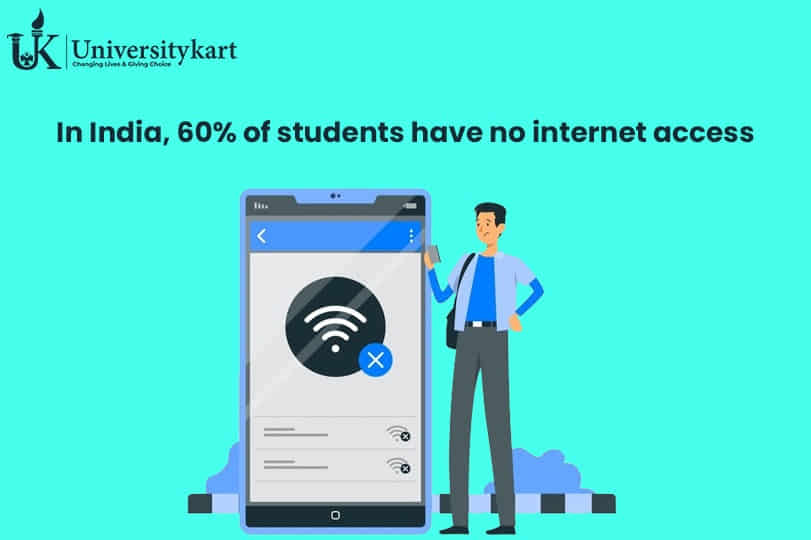
A study conducted by the Azim Premji Foundation showed that more than 60 percent of children in schools in India do not have access to educational opportunities online.
In
the one and a half years since the Covid pandemic erupted in India, The
technological divide is continuing to create difficulties in learning and
teaching remotely According to experts. Learning
and teaching activities needed to be moved online when the disease forced the
closing of colleges and schools. Although
technology has ensured that learning wasn't completely suspended, however, the
digital divide is still making learning remotely an 'operational nightmare'.
60 percent of students are
unable to use online education.
A
study conducted by The Azim Premji Foundation showed that more than 60% of
students in India are unable to access online education opportunities. Similar research conducted by Oxfam India found that even
for students attending private schools in urban areas 50% of parents complained
about problems with Internet connectivity and speed. Another third of them struggled with the costs of mobile
phone data.
A mere
20 percent of school-aged children in India were offered remote education in
the pandemic of which only half of them took part in online live lessons in a
recent national sample survey conducted by ICRIER and LIRNEasia a think tank
that focuses on the digital aspect of policy.
School drop out rate during Covid
In
actuality, 38 percent of households claimed that they had at least one kid who had been unable to attend school because of Covid-19. "Digital schooling was the only logical way forward
to continue learning for children during the pandemic. But now, there is a need
to categorically address some pertinent issues for building a more resilient
system for the future, regardless of whether conventional schooling or digital
is the primary way forward," said Amruta Singh an education specialist who
is working in K12 education.
According
to Sangeeta Gadre who is a Delhi University professor, the issue of digital
divides was a problem that faced both sides of the academic exchange whether
the teacher or student. "While
advancing the cause of digitalization, these challenges must be accounted for.
We also need to be cognizant of the fact that women are proportionately more
disadvantaged when it comes to the usage of digital devices," Gadre
stated.
Technology's relevance
Urvashi
Sahni is an associate of the Center for Universal Education at the Brookings
Institution, said, "Technology has the potential to achieve universal
quality education and improve learning outcomes. But to unleash its potential,
the digital divide and the embedded gender divide must be addressed."
"Access
to technology and the Internet is an urgent requirement in the information age.
It should no longer be a luxury," she declared.
A professor at Ambedkar University, "The digital divide continues to make remote learning an operational nightmare. Over a year into the pandemic, it is still a challenge and cannot replace the traditional classroom learning."
Trending Articles
View All-
UPMSP 2025 Exam Schedule OUT: Download Class 10 & 12 Time Table
Dec, 13, 2024 Read More -
UK Board Date Sheet 2025 Out: Check Uttarakhand Class 10, 12 Exam Dates
Dec, 12, 2024 Read More -
Top 10 Indian Colleges in QS World University Sustainability Rankings 2025
Dec, 12, 2024 Read More -
AIBE XIX 2024: Dress Code, Important Guidelines & Dos and Don’ts
Dec, 11, 2024 Read More -
HBSE 2025 Exam Dates Out: Download HBSE 10th, 12th Date Sheet PDF
Dec, 10, 2024 Read More -
MAT Exam 2024: PBT, CBT, IBT Schedule, Syllabus, Eligibility, Pattern, Result & Cut Off Details
Dec, 03, 2024 Read More -
CBSE Class 12 Marking Scheme 2025: Grading System, CGPA to Percentage Calculator
Nov, 27, 2024 Read More -
CBSE Class 12 Previous Year Question Papers 2024-25: Download PDFs, Exam Date, Marking Scheme
Nov, 26, 2024 Read More -
CBSE Class 12 Date Sheet 2025 Released: Download CBSE Board 12th Time Table Stream-wise PDF Here
Nov, 26, 2024 Read More -
NIRF Ranking 2024 for Top Management Colleges: List of Top Management Institutes in India
Aug, 21, 2024 Read More
Trending News
View All-
NEET UG Stray Vacancy Round 2 Results Out: Download PDF Here
Dec, 13, 2024 Read More -
UTET 2024 Result Out: Check Your Uttarakhand TET Marks Here
Dec, 13, 2024 Read More -
NEET PG 2024 Round 2 Results Out: Download Seat Allocation PDF Here
Dec, 13, 2024 Read More -
REET 2024 Exam Date Announced: Register for Level 1 or 2 from Dec 16
Dec, 13, 2024 Read More -
Check CAT 2024 Result Updates: Release Date & Download Steps for Scorecard
Dec, 13, 2024 Read More -
INI CET 2025 Round 1 Choice Filling Ends: Check How to Fill Preferences
Dec, 13, 2024 Read More -
AILET 2025 Results Out! Learn How to Download Your Scorecard
Dec, 13, 2024 Read More -
GSEB 12वीं परीक्षा 2025: गुजरात बोर्ड डेटशीट में बदलाव, यहां करें चेक
Dec, 12, 2024 Read More -
Rajasthan AYUSH PG Counselling 2024: Stray Vacancy Round Registration Open
Dec, 12, 2024 Read More -
UGC NET December 2024 Application Closed: Last Date to Pay Fee Online
Dec, 12, 2024 Read More











 back
back